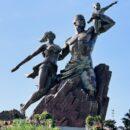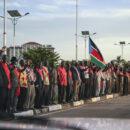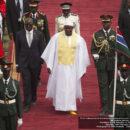All Quiet in Sudan?
To date, the application by Moreno Ocampo for an arrest warrant for President Omar al Bashir has not led to disaster in Sudan. The CPA is intact, the UN operations are continuing, there have been no clashes between government supporters and enemies. In fact, the country appears calmer than last week. What is going on?
Most importantly, Monday’s announcement brought Sudanese together rather than dividing them. In the weeks and days leading up to the Prosecutor’s announcement, leading Sudanese political figures learned of what was likely to happen. This included President Bashir himself, whose immediate personal response was anger. Had the Prosecutor’s statement come as a surprise, his fury might have been boundless. But by the time the announcement was made, he was prepared and calm. During the five days before the announcement, each of the main political parties conducted internal discussions. The outcome was a remarkable unanimity that the ICC should not derail the CPA and the progress towards democracy. In fact, the adoption of the electoral law was timed for July 14, with great fanfare, to make the point that Sudan is on the road to democracy.
One key figure was al Sadiq al Mahdi, leader of the Umma Party and the strongest supporter of the ICC within Khartoum. He commented that “˜justice and stability are at loggerheads.’ And he concluded that stability should win out. Other mainstream Northern parties broadly shared his views, from the Communists to Turabi’s Popular Congress.
The SPLM leadership held an intense internal discussion in Juba. Rumors abounded that the party was considering this the moment to withdraw from the Government of National Unity. The SPLM was already up in arms about what many saw as an arbitrary action by President Bashir to dismiss Pagan Amum on the basis of remarks he had made about Sudan being a “˜failed state.’ In the event, however, the SPLM’s decision was to strongly support the CPA and the President. When this decision was announced at a cabinet meeting on Sunday, the sense of relief in the NCP was almost tangible.
There was also fierce debate within the ruling NCP. The powerbrokers in the party reviewed their options and developed a strategy. One element of this is to solicit as much internal support as possible. Within the NCP this includes mobilizing the rank and file with the promise to be prepared for any eventuality. The militants have been reined in. Certainly there will be fiery public rallies and speeches, but it is unlikely that these will translate into aggressive action soon. The NCP is also weaker than before””few are prepared to go out on a jihad, unlike the early 1990s. Tipped that the charges would be made against Bashir and Bashir only, the NCP also recognized the chance for presenting the Prosecutor’s step as a national challenge, and therefore presented it to the other parties as such. Also, anticipating charges of genocide, the NCP was confident that they would be able to rally a broader spectrum of support against what would be seen as a national affront.
The second strand of the government strategy has been to seek solidarity from regional organizations including the League of Arab States, the African Union and the Organization of the Islamic Conference. By last weekend, it was clear that the regional organizations all had strong objections to the ICC’s move. Many African states, including Egypt, have been early and strong supporters of the ICC, and their lack of support for this move by the Prosecutor reassured Khartoum. The AU’s new Chairperson, Jean Ping, was particularly outspoken.
The logic of this strategy is that leading states within the regional organizations will in turn mount a challenge at the UN. The UN Secretary General, Ban Ki Moon, has repeatedly asserted that the ICC is completely independent. This claim cuts little ice in Khartoum. But Bashir has said he is ready to maintain its existing agreements with the UN for the time being. However, should the UN fail to block the ICC’s action, then Sudan will interpret the move as a hostile act, and respond accordingly. At this point, all agreements with the UN will then be up for renegotiation. The option of reacting against the UN (and humanitarian agencies) has been kept open””but deferred until Khartoum sees whether Ocampo gets his way or not.
The NCP’s reaction has been fronted by Vice President Ali Osman Taha, the architect of the CPA and a man considered as a moderate in the west, and Ghazi Salah al Din Attabani, a civilian presidential advisor well-known for his ability to articulate complex issues, who negotiated the Machakos Protocol in 2002. President Bashir’s initial public comments were confined to press conferences rather than public rallies””events at which he tends to make fiery outbursts.
In Darfur, the political response has been more polarized. But the level of popular support expressed for the ICC turned out to be less than expected. An important reason for this is JEM’s response. The JEM leadership has consistently demanded accountability for crimes committed in Darfur, but it also insists on a Sudanese solution to the crisis, rather than an approach that puts international organizations in the driving seat. For this reason, JEM was never outspoken in support of international military intervention, and has expressed a mixed reaction in response to Moreno Ocampo’s announcement. The response of SLA leaders has been mixed. Also, the key NCP figures in Darfur, such as the state governors, have been in Khartoum””we shall discover their instructions, and their own feelings, when they return to Darfur. The Darfurian Arabs have also been quiet up to now, their true stand unclear. As of this week, the main topic of conversation among ordinary Darfurians is the weather””it is raining.
The danger of excluding or marginalizing Darfurians in the elite national political consensus is real. Both the SPLM and the Umma Party warned of this. A national committee, composed of representatives of all parties in the GoNU, and headed by Sadiq al Mahdi, has been set up to develop a common approach to the Darfur crisis. This is unlikely to win the confidence of the Darfurians without major political concessions backed by strong guarantees. But it is a start.
By the time of the Prosecutor’s announcement, therefore, there was a broad political consensus across Sudan in favor of the CPA, elections, and against the indictment of Bashir. This was the logical outcome of the fact that the SPLM and the northern opposition had long ago abandoned attempts to remove the NCP by force. This made Bashir more comfortable and relaxed. His response was always going to be driven primarily by his own internal political calculus””and especially his need to appear strong if he felt threatened. As he emerged politically stronger on Monday, his response was commensurately restrained.
While the GoNU is stronger, the NCP is weakened by the ICC’s step. The NCP is more reliant than before on its established partnership with the SPLM and its new alliance with the Umma Party, and it will need to make concessions to Darfur and in the CPA in order to maintain this political momentum.
When Moreno Ocampo made his announcement on Monday, the extreme nature of the charges (genocide against Fur, Masalit and Zaghawa) and the allegation that President Bashir was personally in total command of the state apparatus, made it much easier for the NCP to convincingly present the charges as politically-motivated. Nobody in Sudan, even the regime’s harshest critic, believes that Bashir was in total command of the organs of state, which bent to his every instruction. The Chief Prosecutor’s statement on Monday had the effect of making him look like any other polemicist speaking about Sudan without understanding the nature of the Sudanese state and society.
Thus far, Sudanese politicians have been able to manage the impact of the Prosecutor’s application. This approach will continue for the next few weeks, as the ICC’s judges begin to consider the application and diplomats explore possibilities for ways in which Sudan might offer sufficient concessions to make an Article 16 deferment a realistic option””which is still a long way away. Key to this will be how events develop in Darfur in the immediate future and whether the region remains calm or whether a new round of bloodshed is in the offing. A spirit of compromise has driven Sudanese politics this last week. Most Sudanese political leaders assume that everything is ultimately negotiable and manageable, and that the options of temporizing will always exist. But the ICC process has been walled off from all the processes of political management at which Sudanese politicians are so skilled.
When the ICC’s judges approach their conclusions””most probably in September””and prepare to issue an arrest warrant, the moment of truth will be upon Sudan, and upon the UN Security Council. Realizing the limits of deal-making and buying time, and making the tough political decisions accordingly, will be the biggest challenge to Sudan’s political leaders in the months ahead. The moment of truth has been postponed.







Gratuitous and perhaps unfair remarks follow, take with grain of salt.
Alex (in blogging it is all first names, so i take the liberty…) wrote: “Nobody in Sudan, even the regime’s harshest critic, believes that Bashir was in total command of the organs of state, which bent to his every instruction. The Chief Prosecutor’s statement on Monday had the effect of making him [Chif Pros.] look like any other polemicist speaking about Sudan without understanding the nature of the Sudanese state and society.”
But this is polemics incarnate! I mean Alex’s misinterpretation- is it willful?- of what the idea of “total command” means, as if it were the idea that since Bashir was not personally giving orders to burn villages he was not therefore in “total command”, e.g. as if George Bush were not in “total command” of Guantanamo because he “didn’t see personally” what was happening there! Bashir was and is the President, and the organs of the state in Darfur were working to carry out an anti-civilian counter-insurgency campaign. If Bashir was working night and day, threatening and cajoling to resign, in order to reign in a counter-insurgency run by his underlings, then that will be his defense at the trial, and he’ll be acquitted. Does anyone really think that is the accurate historical record for Darfur? That Mr. Bashir and associates will be able to convince the judges that this was the case? If so, then people who have access to facts and interpretations like the following: “This included President Bashir himself, whose immediate personal response was anger. Had the Prosecutor’s statement come as a surprise, his fury might have been boundless.” will be giving testimony, and I will look forward to reading it!
May I imagine the testimony for a minute, recognizing that making light in the face of the plight of 2.5 million displaced persons is a luxury I am grateful for.
“Yes, Mr. Ocampo, I was in the room with Pres. Bashir when he heard the announcement, and he banged his fist on the table very angrily, so that is how I knew he was angry, and then his houseboy told me later that he forgot to take his shoes off when he came into the house, and he only does that when he is very, very angry.”
“And would you say that the mood of anger continued a long time?”
“Well, later that evening some of his close associates came by the house, and they were discussing things very loudly. But at one point they did all burst out laughing and the houseboy heard Mr. Bashir laugh too. But he may have been being polite. He often laughs around his friends even when he is angry.”
Me again… something about Alex’s choice of the word “fury” (“his fury would have been boundless”) kept bothering me…. so an online note from a definition website:
“Furies Greek & Roman Mythology. The three terrible winged goddesses with serpentine hair, Alecto, Megaera, and Tisiphone, who pursue and punish doers of unavenged crimes.”
Particularly ironic, then.
But in any case, I would suggest, “his meanspiritedness would have been boundless”
There is no need, with “fury”, to elevate him above tinpot status.
Hands down the most thoughtful and nuanced political commentary available.
Dear Michael,
yes, you are trivializing the events of the last couple of weeks. the significance of the personal character of the Sudanese president, and the import of the statements of the world’s most prominent international prosecutor, whose choice of words is not to be taken lightly.
Alex